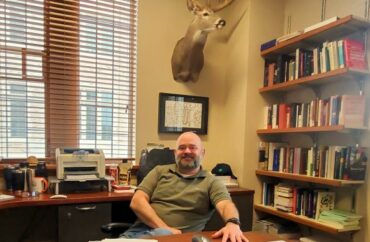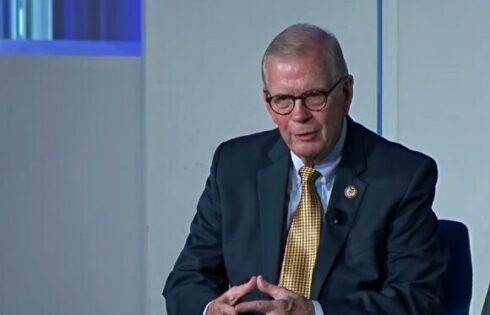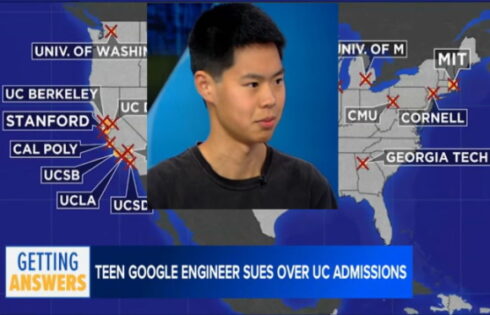
UPDATED
SOUTH BEND, Ind. – “Who counts as one of us, who gets to do the counting and according to what criteria?”
Though it is the broader idea of a future book, it is also a question that Professor O. Carter Snead has been working on for two decades now, including the past 12 years as the director of the de Nicola Center for Ethics and Culture at the University of Notre Dame.
The bioethicist has written papers, given talks, testified to Congress, and wrote a book about this very topic: “What it Means to be Human.”
Under his leadership, the center hosted conferences and training for the pro-life movement. It also published books and continues to recruit academics to research and write about important bioethics topics.
Snead began his career in this field as general counsel to Leon Kass, chairman of the President’s Council on Bioethics. Decades after shaping policy on stem cell research, cloning, and end of life issues, Snead is confronting new challenges.
Snead will stay on at the de Nicola center and as a law professor. But he told The College Fix during an in-person interview in late April he is taking leave to research another book about upcoming bioethical problems.
The thing about talking to a bioethicist like Snead is you are in some ways reassured people like him and the de Nicola Center are thinking about the ethics of advances in technology. It is good that someone with a grounding in Christian morality is testifying to Congress, writing academic papers, and authoring books to shape public policy and opinion.
On the other hand, you might leave the interview worried for the future.
“Synthetic embryos,” Snead said, is one of the topics he plans to explore for an upcoming book. “To make them, scientists use pluripotent cells to assemble what appear to be organisms at the embryo stage of development. They are working on cultivating them outside the body to very advanced stages of development, such that they even have beating hearts and primitive brain structures.”
Snead talks about a scientist that wants to create an embryo through seven weeks outside a womb.
“The ontological and ethical questions are whether these beings are mere artifacts with limited developmental trajectories, or are they actually disabled embryos created for the sake of research in which they will be destroyed,” he said.
“Another case study in the book will be animal-human chimeras, focusing particularly on non-human animals whose brains are made of human neurons, or who can produce human gametes- egg and sperm,” he said.
The third case his new book will take up will be “neural organoids, sometimes controversially described as ‘mini-brains’” that are constructed and exist outside the body.
“Some of them have formed optic cups, which are the precursors of eyes,” Snead said. The case of neural organoids requires us to consider “the nature of organisms, parts versus wholes, embodiment, and the markers of humanity.”
While those are some of the future bioethics issues, he said abortion, IVF, and end-of-life debates will also remain a focus.
The topics “will require a lot of additional attention.”
Snead and the de Nicola Center won’t be tackling these issues alone.
Sorin Fellows reach across all disciplines
A major achievement of the center under Professor Snead’s tenure is “formalizing” the Sorin Fellowship.
While law, medicine, and politics are the most common areas, “we have every major and every college represented among the Sorin Fellows,” Snead said.
This includes business students who go into accounting and economics, Snead said.
Engineering and neuroscience are other fields represented.
“There’s really no profession that’s not represented among our Sorin Fellows,” the professor said.
Among those is Luke Schafer, currently a student at Harvard Law School. In a twist of irony, the Sorin Fellows program helped Schafer choose to attend law school at Harvard instead of at Notre Dame.
“I’m not sure I would be at Harvard Law School without the formation of the Sorin Fellows program,” Schafer told The Fix via email. “I was always worried about Harvard because of its hostility to my values, but I eventually realized that the formation I [received] at Notre Dame — and especially as a Sorin Fellow — prepared me for this challenge.”
“If I didn’t think that my faith was strong enough, or that I didn’t have a strong enough group of friends to rely upon in challenging times, I’m not sure I would have chosen to attend Harvard,” he said.
Schafer cited his friendships through the program and its curriculum as helping him. He enjoyed attending daily Mass with other Sorin Fellows. “In addition to the opportunities to deepen my faith, the Sorin Fellows program also gave me the opportunity to enrich my understanding of the Catholic intellectual tradition,” Schafer said.
The law student described his few direct encounters with Snead as “generous and kind.”
“Professor Snead is an incredible asset to the de Nicola Center and he will be dearly missed.”
Editor’s note: The headline was edited to call de Nicola an ‘ethics’ center not ‘bioethics.’
MORE: ‘Morning in America’: Professors praise end of Roe v. Wade
IMAGE: The College Fix
Like The College Fix on Facebook / Follow us on Twitter






Please join the conversation about our stories on Facebook, Twitter, Instagram, Reddit, MeWe, Rumble, Gab, Minds and Gettr.